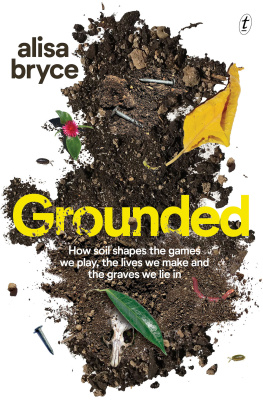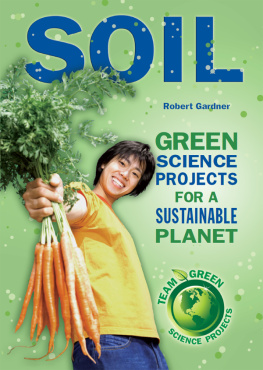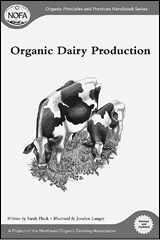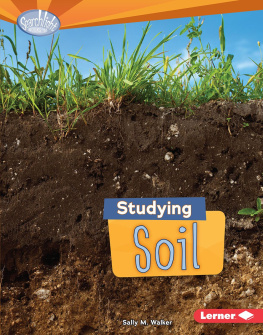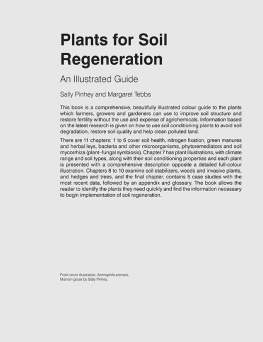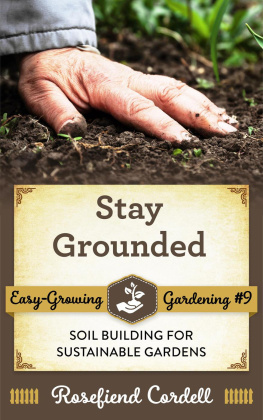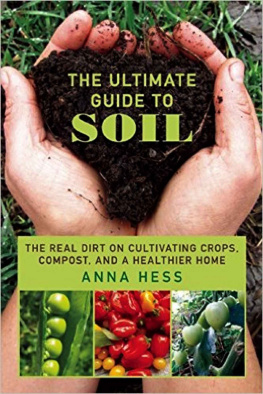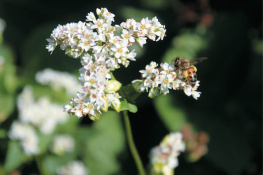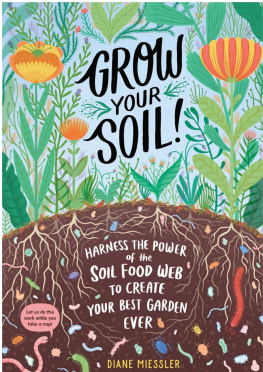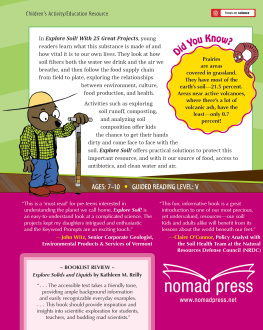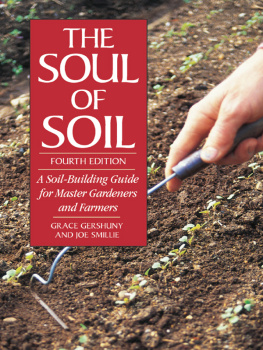

Life on land could not exist without soil. Almost everything we need can be traced to the soil: food, fibre, medicines - even oxygen produced by plants. What would we be without it? Certainly not a planet worthy of the name Earth.
There are already plenty of books about agriculture, ecology or how to grow tomatoes. This book is about the other stuff. Like
- how soil evidence can nail a murderer
- the ingredients that make a Test cricket pitch
- how the soil affects the taste of your favourite wine
- the soil microbes that could be the next wonder drug
- tips for digging a POW camp escape tunnel (disclaimer: dont try it at home) or mounting an invasion of Normandy (ditto)
- how to be ecofriendly when youre dead
In the unputdownable Grounded, soil scientist Alisa Bryce gives you the dirt on all thisand much, much more.
For Mum and Dad
Contents
IF IM AT a party and I dont want to talk to someone Ive just met, Ill tell them Im a soil scientist.
Sorry? Their brow furrows.
Soil, I say, pointing to the floor. Earth, dirt I dont like using the word dirt but it is sometimes necessary.
Ah, they nod. Soil. Some say it twice, as if trying it out for the first time.
A soil scientist, I repeat.
They may or may not ask what a soil scientist does, before the inevitable point where silence falls and they excuse themselves to go get a drink.
If I do feel like talking, Ill say Im a writer, though the outcome is usually the same. They ask what sort of writer, I say science writer, they ask what sort of science, I say soil.
Then they go get a drink.
Its understandable. Soil is an unusual topic. The probability of randomly meeting someone who can converse on the subject is small. There are only about a thousand soil scientists in Australia, so the chances that you have met a soil scientist are even smaller. I didnt know it was even a career option until my second year at university, when studying a Bachelor of Science in Agriculture.
Soil is, of course, usually examined through the lens of agriculture (and if not agriculture then climate science), which is also understandable. Over ninety-five per cent of our food comes from the soil. Most people who work with soil work in agriculture, and most books about soil are in some way about agriculturedifferent cultivation methods, environmental impacts, historical developments and so on.
This book is different. It does not discuss the merits of various farming practices, and there is no advice on growing tastier tomatoes. Nor does it deal with carbon sequestration, or any of the other topics that were popular at the time of writing. This is not a book about climate change, erosion or environmental degradation. There are plenty of other books available on these topics. Instead, this book explores the other ways the sticky, macabre and quite frankly fascinating world of soil underpins much of life, culture and society.
Follow the mysteries in the Crime chapter and pour yourself a robust glass of shiraz to read the Wine chapter. Slap on a face mask as you read about clay and beauty. Travel back in time with me, 3.7 billion years, to a world where soil and life were just coming into being. Imagine what it might have been like for the soldiers deployed to conduct covert soil sampling on the Normandy beaches in January 1944. Ponder the concept of a nutrient afterlife rather than a soul afterlife. And okay, lets talk about farmingbut how it might be done on Mars.
Researching this book has been a lot of fun (though I do wonder if I am now on an ASIO watchlist, and if so, I would like to assure the good people of the various security forces that my questions about the blast radius of sixteen kilos of TNT and the use of lime to dissolve human bodies were purely academic). But a book that covers many topics can, of course, only offer a glimpse into each, and for every chapter I included, I had to leave at least one out.
There isnt the scope to delve into the nuances of what is a very complex science, and this is obviously not a textbook. It is a taster, a teaser: a fun introduction to something you probably didnt realise was so fabulous. The wonderful world of soil.
IMAGINE YOU ARE lost in a vast wilderness. No phone reception, no satellite phone: no way to call for help unless you are skilled with smoke signals. You have tried shouting, crying and praying to gods you didnt really believe in until now. The only response is the occasional bird call. You are completely alone. Someone may find you eventually, but until then the only way you are going to survive is by using the resources at hand. (It helps if you have imagined yourself into a forest-type wilderness rather than a desert.)
First, the basics. You will need to find water, food and shelter. If you are lucky, youll find running water, but do you have anything to store it in? You can forage, if you know which plants are edible and which are poisonous; hunting means building a trap or maybe a spear using sticks; for fishing youll need a line, a hook, a netwhat will you make them from? You will need a fire: for warmth, to cook what you have caught and to fend off whatevers doing all that howling (probably just the wind). Fire needs kindling and a spark. If you are really good at this survival business, you might fashion a mat out of reeds and start carving a bowl or spoon, because luckily you had a knife in your pocket when you got lost.
It will be tough. But everything you need to survive is somewhere in your surroundings and almost all those things are there because of the soil. The branches for kindling, the shrub that bore the (thankfully non-toxic) berries, and the reeds for the basket.
Humans lived this way, off local resources, for most of human history. It is only very recently that you could just pop out to the shops and buy things you dont need, made on soil in countries far, far away.
Life can only exist because of the soil. That sticky, gritty stuff beneath your feet is the foundation of life on Earth. Except for water and oxygen, everything we need we get from the soiland even then the soil filters the water. If the soil suddenly vanished, land plants would quickly die off, and with them almost everything else. But dont worry, you wouldnt suffocate from lack of oxygen. Youd die from starvation first.
What would we be without soil? Certainly not a planet worthy of the name Earth.
Soil is fascinating and full of paradoxes. It is one of Earths oldest resources, yet soil science is one of the youngest sciences. The soil is both biotic and abiotic, both alive and dead. It is dirty but also an expensive beauty treatment. We are utterly dependent on the soil, yet we take great pains to banish it from our lives.
I have noticed in recent years, however, that soil is slowly making its way into general conversation. Not very often, and not in much depth, but it is there. Every year on 5 December, World Soil Day, theres a smattering of articles about the importance of soil. Gardening has had somewhat of a resurgence, particularly during the pandemic. There are even one or two popular science books about soil now gracing bookshop shelves.
If I asked you Do you know what soil is?, I imagine you would say yes. Everyone knows what soil is. But take a few minutes to think about it. What exactly is this stuff that delights and pains us? Not even soil scientists can agree on an exact definition. Like love, like home, soil is hard to define. It means different things and has different uses to different people.
Next page
